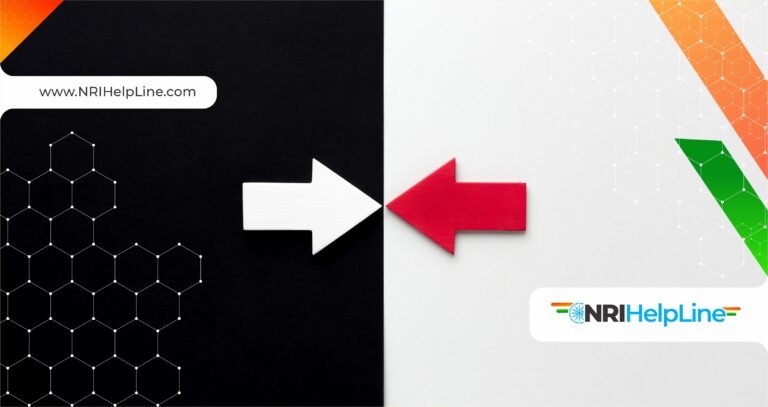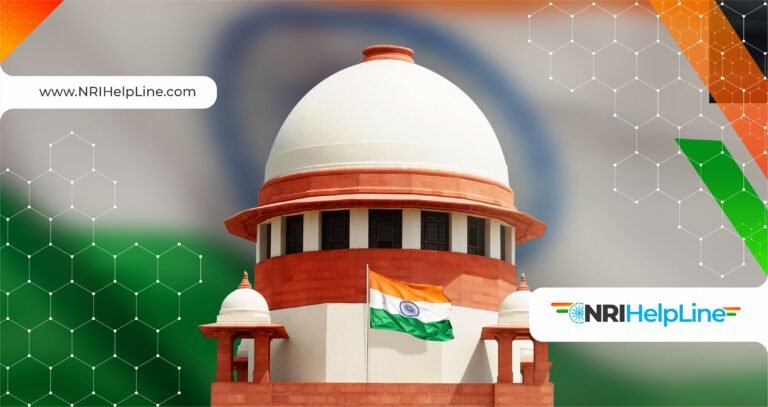NRI Alimony Rights | When it comes to family disputes involving Non-Resident Indians (NRIs), one of the most critical issues is alimony and maintenance. NRI alimony rights govern the financial obligations an NRI has toward their spouse after a divorce, ensuring that the dependent party receives adequate financial support. As divorce rates among NRIs have been on the rise, NRIS need to understand the legal framework surrounding alimony and maintenance rights in India. This article delves into the legal provisions governing NRI alimony rights, recent legal updates, and case studies that highlight how these laws are applied.
NRI Alimony Rights: Legal Framework and Maintenance Laws
India’s legal system offers robust protection when it comes to alimony and maintenance rights for women, particularly in the case of NRIs. However, with the cross-border element involved in NRI divorces, understanding how these laws apply to non-residents is crucial.
1. NRI Alimony Rights under the Hindu Marriage Act, 1955
For NRIs who married under Hindu law, the Hindu Marriage Act, 1955 governs divorce and alimony. Section 24 of the Act allows either spouse to request maintenance during the divorce process. This is known as “pendente lite” alimony. Additionally, Section 25 of the Act provides for permanent alimony, which the court can order based on the financial conditions and lifestyles of both parties.
- Section 24: Allows interim alimony during the divorce process.
- Section 25: Governs permanent alimony based on financial status.
2. NRI Alimony Rights under the Special Marriage Act, 1954
For NRIs married under civil law (Special Marriage Act, 1954), the alimony laws are similar. Section 36 of the Act allows for temporary maintenance, while Section 37 permits permanent alimony. NRIs seeking divorce under this Act must comply with these legal provisions, ensuring that both spouses receive fair treatment regardless of their residential status.
3. Muslim Personal Law
For NRIs married under Muslim law, alimony is governed by personal laws. As per the Muslim Women (Protection of Rights on Divorce) Act, 1986, maintenance is restricted to the “iddat” period (a specified waiting period after divorce), and beyond that, a woman can claim maintenance only if there is a written agreement or under specific circumstances.
Recent Updates on NRI Alimony Rights
Recent years have seen several important legal updates that have shaped the landscape of NRI alimony rights:
- Delhi High Court Ruling: In a landmark case, the Delhi High Court ruled that an NRI wife can file for maintenance in India, even if the marriage took place abroad. This case helped reaffirm the Indian court’s jurisdiction in matters of alimony, even when NRIs are involved.
- Supreme Court Guidelines on Quick Disposal of NRI Divorce Cases: The Supreme Court of India has emphasized the need for swift legal proceedings in NRI divorce cases, particularly in addressing issues related to alimony and child custody. This ensures that dependents do not face undue hardship due to prolonged legal battles.
- Women’s Right to Residence: Another important legal update is related to a woman’s right to reside in a shared household even after filing for divorce. The Protection of Women from Domestic Violence Act, 2005 ensures that NRIs cannot evade their obligations simply by relocating abroad.
NRI Alimony Rights: Factors Influencing Alimony Decisions
When determining NRI alimony rights, Indian courts consider several factors to ensure fair financial support. These include:
- Financial Status: Courts assess the income, assets, and liabilities of both parties. For NRIs, their global income and assets are taken into account, which can significantly affect the alimony amount.
- Duration of Marriage: Longer marriages often lead to higher alimony awards, as the dependent spouse may have sacrificed their career or earning potential during the marriage.
- Living Standards: Courts aim to maintain the dependent spouse’s lifestyle to the extent possible. If an NRI spouse enjoyed a luxurious lifestyle abroad, the alimony amount may be higher to match this standard.
- Custody of Children: If the spouse seeking alimony also has custody of the children, the court may order higher maintenance payments to ensure that the children’s needs are met.
Case Studies: NRI Alimony Rights in Action
Case 1: Alimony for NRI Wife in the US
In one case, an Indian woman married to an NRI residing in the U.S. filed for divorce and alimony in India. Despite the husband’s efforts to contest the jurisdiction, the Indian court upheld its right to hear the case. The court granted substantial alimony, considering the husband’s high earning capacity in the U.S.
Case 2: Alimony Adjustments Due to Income Changes
In another case, an NRI husband living in Dubai experienced a significant reduction in his income after the divorce proceedings. He sought a reduction in his alimony obligations, and the court adjusted the amount based on the new financial realities, while still ensuring fair support for the wife.
Why NRIHelpLine?
At NRIHelpLine, we understand that navigating complex legal systems can be overwhelming, especially when it involves cross-border disputes like alimony. We specialize in providing tailored legal advice to NRIs dealing with divorce and NRI alimony rights. Our expert team ensures that you receive the right guidance, whether it involves negotiating alimony, understanding legal obligations, or ensuring that your financial rights are protected.
We assist you with:
- Expert Legal Consultation: Tailored advice on NRI alimony rights, ensuring compliance with Indian law.
- Representation in Court: Effective legal representation in India, even if you reside abroad.
- Financial Planning: Help in structuring alimony payments that minimize your tax liabilities.
With NRIHelpLine, you have a trusted partner who ensures fair treatment in matters of alimony and maintenance, safeguarding your financial and legal interests.
Conclusion: Protecting NRI Alimony Rights
NRI alimony rights are designed to ensure that both spouses receive fair financial support in the event of a divorce, regardless of their residential status. From understanding the provisions of the Hindu Marriage Act and the Special Marriage Act to considering factors like income, assets, and lifestyle, the Indian legal system offers comprehensive protection to NRIs involved in alimony disputes. By staying informed of recent legal updates and case rulings, NRIs can navigate their rights with greater clarity and confidence.
Whether you’re an NRI spouse seeking maintenance or facing alimony claims, professional legal assistance is crucial for securing the best outcome. NRIHelpLine stands ready to help you understand your rights and obligations, ensuring that you are protected throughout the legal process.
Frequently Asked Questions (FAQs) | NRI Alimony Rights
- Can NRI spouses claim alimony in India if the marriage took place abroad?
Yes, Indian courts have jurisdiction over NRI divorce cases, allowing the spouse to claim alimony in India even if the marriage took place abroad. - Are NRI husbands required to pay alimony if they reside abroad?
Yes, NRI husbands are obligated to pay alimony as per Indian law, and Indian courts can enforce alimony judgments against NRIs living abroad. - Can NRI wives claim alimony if they reside in another country?
Yes, NRI wives can claim alimony in India regardless of their country of residence, as Indian courts have jurisdiction over NRI alimony cases. - How is the amount of alimony determined for NRIs?
The court considers factors such as the NRI’s global income, assets, lifestyle, and the duration of the marriage to determine the alimony amount. - Can alimony payments be modified for NRIs?
Yes, alimony payments can be adjusted if there is a significant change in financial circumstances, such as loss of income or new financial responsibilities.
This article provides a comprehensive guide on NRI alimony rights, offering insights into the legal frameworks, case studies, and expert guidance for NRIs navigating alimony disputes in India.
Additionally, you can explore more about NRI Alimony Rights on our services on our NRIHelpline.
Follow us for more on Twitter | Instagram | LinkedIn | Facebook
External Resources: Income Tax Department India
other article on NRI Alimony Rights
Disclaimer: The information provided on this website ‘NRIHelpLine.com’ or this article “Legal Aspects of NRI Property Inheritance in India: 5 Key Steps” in any context of “NRI Alimony Rights” is for general informational purposes only. All information on the site is provided in good faith, however, we make no representation or warranty of any kind, express or implied, regarding the accuracy, adequacy, validity, reliability, availability, or completeness of any information on the site. Any reliance you place on such information is therefore strictly at your own risk. NRIHelpLine Management shall not be liable for any losses or damages in connection with the use of this information.












